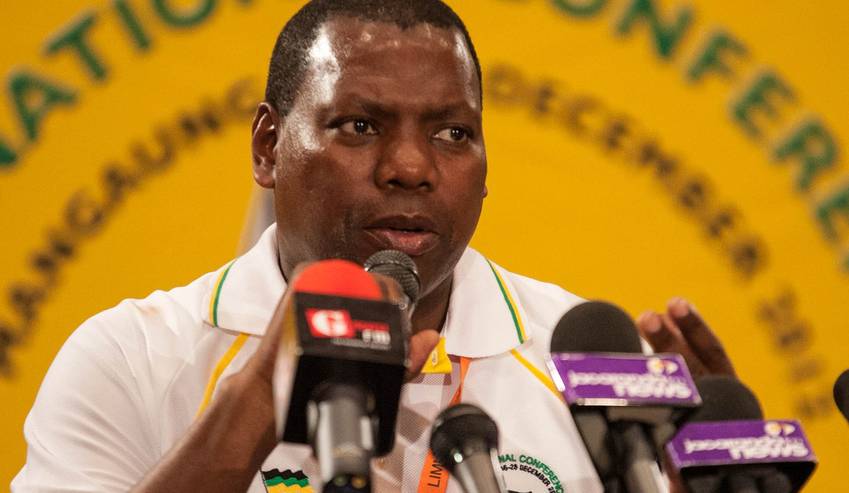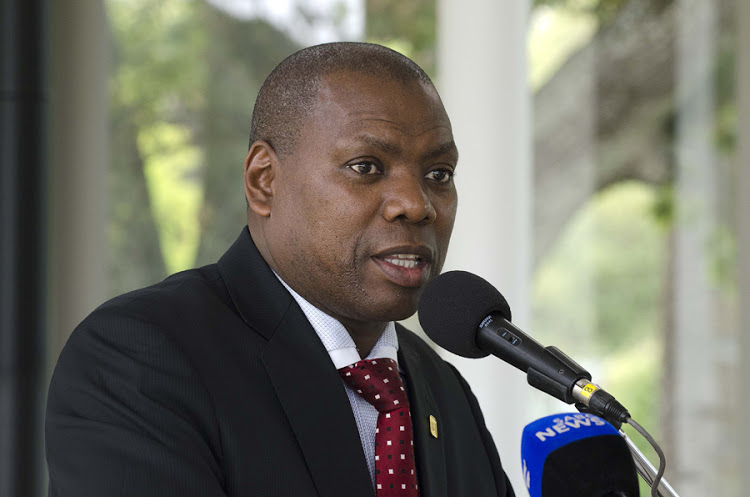 ANC Treasurer-General Zweli Mkhize ,
ANC Treasurer-General Zweli Mkhize ,
South Africa’s ruling African National Congress will come up with a comprehensive policy package to simultaneously boost growth, address racial inequality and tackle a 28 percent unemployment rate, a top party official said.
The ANC is looking at “how you get growth, how you get job creation and how you deal with transformation,’’ ANC Treasurer-General Zweli Mkhize said in an interview Tuesday at a conference in Johannesburg that’s discussing issues ranging from land reform and mine ownership to the central bank’s mandate.
With elections due in two years’ time, the ANC faces an uphill battle to halt a slide in support that saw it lose control of Johannesburg, the economic hub, and Pretoria, the capital, in a local government vote in August. President Jacob Zuma has led calls for “radical economic transformation” to place more of the country’s wealth in the hands of black households, which government data shows earn a fifth of what their white counterparts do.
The most contentious issues being debated at the conference include whether to amend the constitution to allow land seizures without compensation, force mining companies to sell bigger stakes to black investors and to change the central bank’s mandate to focus on promoting the socio-economic well-being of citizens, rather than inflation. Any proposed policy changes will have to be formally adopted at the ANC’s national conference in December, when it will also elect a new president to replace Zuma and other leaders.
Zuma Faction
The faction that supports Zuma’s favored candidate to succeed him, Nkosazana Dlamini-Zuma, who’s his ex-wife and main rival to Deputy President Cyril Ramaphosa, suffered a setback when most party members rejected demonizing “white monopoly capital” as the main cause of inequality in the country.
While it can’t be denied that the economy is white-dominated, nine out 11 ANC panels disagreed with using the phrase “white monopoly capital,” Joel Netshitenzhe, a member of the ANC’s national executive committee, told reporters on Tuesday.
“The ANC always goes for middle ground,” said Mcebisi Ndletyana, a politics professor at the University of Johannesburg. “The idea is to appeal to everyone. It’s better not to be so clear in your wording and say something that everyone can claim. Where you need to be decisive is over leadership, because leadership determines what happens in terms of policy.”
Mining Dispute
Mkhize said that most ANC members want mining companies and the mines ministry to talk through their differences about black ownership targets and favor retaining an independent central bank that sets monetary policy, although some officials hold differing views.
Mineral Resources Minister Mosebenzi Zwane released a Mining Charter on June 15 that requires local mines to be at least 30 percent owned by black people, up from the previous rule of 26 percent and doesn’t recognize deals where stakes were sold to black investors who have now divested. The announcement triggered a selloff in mining stocks, and the Chamber of Mines, which represents the biggest producers, said it will challenge the law in court.
Within the ANC, there’s broad consensus that skewed land ownership patterns that originated under colonial and white-minority rule must be addressed, Mkhize said.
“There is a huge element of pressure that people are feeling of an economy that is not performing,” he said. “Our responsibility if to process views from the public, not to suppress them.”
Stephen Koseff, the chief executive officer of Investec Ltd., said populist policies aren’t the way for the ANC to go.
‘Disastrous’ Repercussions
“While they may be politically expedient in the short term, they have disastrous long-term repercussions,” he said at a breakfast for business executives on the sidelines of the conference. “It would be a tragedy if we were to blindly follow out-dated and failed ideologies. Redistribution at the expense of growth always results in benefiting a few at the expense of many, and it’s poor people who end up suffering as the economy spirals down.”
Policy proposals that relate to the economy will be announced on Wednesday, the final day of the six-day conference.
Small Business Minister Lindiwe Zulu told reporters that while the ANC is committed to working with investors and private business, “the national interest comes first for us.”
“You can bring all your investors and be excited about them — as long as the people of South Africa do not begin to see the value of what you are trying to do then it becomes a problem,” she said. “You might end up with a revolt that might not be good for the investors themselves. Their investments would be more secure if there is peace, security and prosperity for South Africans.”
The ANC’s youth league has said it won’t settle for watered down measures to redistribute wealth and land.
“We know that some of our proposals are radical and we have been told they will cause capital flight,” Kwazi Mshengu, the league’s chairman in the eastern KwaZulu-Natal province, said in an interview. “We must understand that we are a revolutionary party. We must find a balance between the interests of private capital, which is necessary in our country, but also the demands of our people. You have a case in South Africa where the people serve the economy and the economy doesn’t serve the people.”

